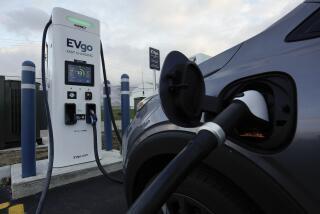Consumer Reports rejects claim that it did Hyundai mileage study
The chart emailed from Hyundai Motor America on Wednesday morning seemed to have good news for the beleaguered South Korean car manufacturer whose claims on fuel efficiency for some vehicles were exposed as false.
A chart that allegedly contained Consumer Reports data showed that Hyundai’s revised fuel efficiency claims were more in line with EPA combined fuel estimates than all but three of the 15 auto companies listed.
“We at Hyundai believe that Consumer Reports real-world average fuel economy testing results and EPA combined fuel economy results should correlate, and in fact do correlate nicely for some brands,” Hyundai Motor America said in a statement.
PHOTOS: Hyundai and Kia models with inflated fuel economy ratings
“Among all brands, Hyundai does particularly well in this correlation, with no high-volume brand having a better correlation between EPA combined and Consumer Reports real-world fuel economy,” Hyundai added.
The same chart also showed one competitor -- Ford -- fall far short of the mark.
But there’s a problem. After reviewing its records, Consumer Reports was left scratching its collective head. The magazine hadn’t done the analysis Hyundai claimed they had done.
“The analysis of our data presented here was not done by us,” said C. Matt Fields, senior communications counsel for Consumer Reports. “We have not done or published any report where this information can be concluded from. We can’t say that it’s accurate or inaccurate because it’s not clear to us what methodology they used.”
Doug Love, associate director of communications for Consumer Reports, added, “If you’re coming to us to ask can we confirm this information, that is a bit of a challenge to us. We haven’t done that sort of analysis. This [the chart] is something we want to take a look at in a little more depth.”
Moreover, Love pointed out that the chart appeared to be something that Consumer Reports explicitly will not do when it conducts testing and analysis.
“We have a ‘no commercialization’ policy as well that precludes manufacturers and companies whose products and services we evaluate from using these materials for their own purposes,” Love said.
“I don’t know where Hyundai got this information,” Love said.
Hyundai and Kia issued an apology in November for overstating their mileage figures. They said they would give debit cards to nearly a million owners to make up for the difference in the lower miles per gallon logged by the vehicles.
The discrepancies were found by the Environmental Protection Agency, which began investigating after consumers complained.
Ford Motor Co’s claims about the fuel efficiency of its Fusion and C-Max hybrids have also been called into question.
Consumer Reports did its own tests and could not replicate the 47 mpg that Ford’s claims for the city, highway and combined ratings for the vehicles.
ALSO:
Southern California gasoline prices soar
Hyundai, Kia admit gas mileage lower than advertised
Consumer Reports says Ford Fusion, C-Max don’t achieve mileage claims







